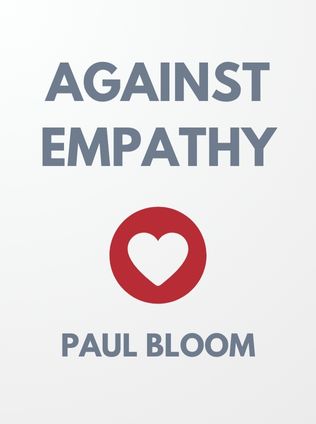
Against Empathy
The Case for Rational Compassion
By Paul Bloom
Published 12/2016
About the Author
Paul Bloom is a distinguished psychologist and cognitive scientist renowned for his thought-provoking explorations into human nature. A professor at Yale University, Bloom has contributed significantly to the field with his research on how we perceive the world and interact with one another. His book Against Empathy, published in 2016, is a continuation of his efforts to challenge widely accepted beliefs, specifically the idea that empathy is an unequivocally positive force in moral decision-making.
Bloom’s intellectual journey spans various topics, from the origins of human morality to the psychology of pleasure and pain. His other works, such as Just Babies: The Origins of Good and Evil and The Sweet Spot: The Pleasures of Suffering and the Search for Meaning, demonstrate his commitment to uncovering the complexities of human behavior. Through his research, he seeks to refine our understanding of morality, compassion, and the ways in which we can lead better, more fulfilling lives.
Bloom's academic background and his rigorous approach to psychological inquiry give him a unique perspective on issues that sit at the intersection of emotion, reason, and morality. He is not one to shy away from controversial ideas, and his work consistently pushes the boundaries of conventional thinking. In Against Empathy, Bloom aims to provoke a reevaluation of how we approach moral decisions, urging readers to consider the potential pitfalls of empathy and to explore alternative ways of thinking about compassion and kindness.
Main Idea
Against Empathy is a contrarian examination of empathy’s role in human morality. Contrary to popular belief, Bloom argues that empathy—commonly understood as the ability to feel what others feel—can often lead us astray when making moral decisions. Instead of relying on our emotional responses, Bloom suggests that a more rational and reasoned approach—what he calls "reasoned compassion"—is necessary for making decisions that truly benefit others and society as a whole.
Bloom’s thesis challenges the conventional wisdom that empathy is the cornerstone of moral behavior. He contends that empathy, while often well-intentioned, can be biased, narrow in focus, and ultimately counterproductive. By highlighting the limitations of empathy, Bloom advocates for a shift toward a more analytical and impartial way of caring for others, one that prioritizes long-term outcomes over immediate emotional gratification.
“Empathy has some wonderful things going for it. But as a moral guide, it’s dangerously limited, arbitrary, and capricious.” — Paul Bloom
Table of Contents
- Introduction: The Empathy Problem
- What is Empathy?
- Empathy vs. Rational Compassion
- The Consequences of Empathy
- The Biases of Empathy
- Why Empathy Isn’t Necessary for Morality
- Reasoned Compassion: A Better Approach
- How to Make Better Moral Decisions
- Conclusion: Moving Beyond Empathy
Introduction: The Empathy Problem
In the introduction, Bloom sets the stage by questioning the universally accepted belief that empathy is the cornerstone of moral behavior. He challenges the idea that feeling others' emotions is the best way to guide our decisions, especially in situations with moral implications. According to Bloom, the problem with empathy lies in its partiality and emotional intensity, which often lead us to make decisions that, while seemingly compassionate, are ultimately irrational and sometimes harmful.
Bloom introduces the reader to the concept of empathy as a "spotlight"—a metaphor that underscores its limited focus. He argues that empathy directs our attention to specific individuals, often those who are most like us or those whose suffering is most visible, while leaving others in the dark. This selective focus, Bloom suggests, can result in unfair and biased decision-making.
“Empathy is like a spotlight, focusing our attention on specific individuals while neglecting the broader context and the needs of others who may be just as deserving.” — Paul Bloom
What is Empathy?
In this section, Bloom delves into the definition of empathy, distinguishing between two primary types: emotional empathy and cognitive empathy. Emotional empathy involves feeling what others feel, a deeply personal and visceral response that can often be overwhelming. Cognitive empathy, on the other hand, is about understanding another person’s perspective without necessarily sharing their emotions.
Bloom draws on the work of philosopher Adam Smith, who distinguished between “sympathy” (akin to what we now call empathy) and more rational forms of compassion. Bloom argues that while emotional empathy might seem like a direct and humane way to connect with others, it can lead to decisions that are not in the best interest of the larger group or even the person we are empathizing with.
Sign up for FREE and get access to 1,400+ books summaries.
You May Also Like
The Subtle Art of Not Giving a F*ck
A Counterintuitive Approach to Living a Good Life
By Mark MansonRich Dad Poor Dad
What the Rich Teach Their Kids About Money - That the Poor and Middle Class Do Not!
By Robert T. KiyosakiHow To Win Friends and Influence People
The All-Time Classic Manual Of People Skills
By Dale CarnegieFreakonomics
A Rogue Economist Explores the Hidden Side of Everything
By Steven D. Levitt and Stephen J. Dubner



















